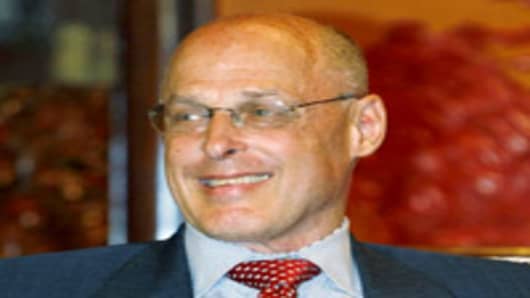Treasury Secretary Henry Paulson said that the Federal Reserve's decision to begin lending directly to Wall Street investment banks should be limited to emergency conditions only.
"It would be premature to jump to the conclusion that all broker-dealers or other potentially important financial firms in our system today should have permanent access to the Fed's liquidity facility," he said.
But it is not premature, he said, to think about new or different regulations. We must all "think more broadly about the regulatory and supervisory framework that is consistent with the promotion and maintenance of financial stability."
Paulson told a US Chamber of Commerce capital markets conference that the credit markets' current problems are an exceptional circumstance, and "at this time, the Federal Reserve's recent action should be viewed as a precedent only for unusual periods of turmoil."
Paulson also said that policy-makers should not interfere with an "inevitable" drop in housing pricesbut should work to minimize the impact on the economy.
Besides putting up $29 billion to help to finance the JP Morgan Chase takeover of Bear Stearns -- a deal in which the Treasury Secretary was himself involved -- the Fed has also opened its discount window to non-banks for the first time since the Depression and greatly expanded its lending of Treasury securities to broker-dealers.
The rapid extension of hundreds of billions of dollars in Fed support to non-banks has inevitably raised a question which Paulson pointed out: "The trade-off for this subsidized funding (for banks) is regulation tailored to protect the taxpayers from moral hazard this insurance creates." But Wall Street firms have faced nothing like the detailed rules and detailed examination of their finances that are mandated for banks.
Unsurprisingly, there are now calls in Congress to more heavily regulate the brokerage firms.
Democrats have proposed a new watchdog agency for the risk management practices of Wall Street firms, expanded powers for the Federal Reserve and requiring the investment companies to keep higher capital cushions against unexpected losses.
Members of the Senate Finance Committee also have asked for the full details of the Bear Stearns acquisition, including a description of the assets the Fed will take on from Bear to allow the deal to happen, in order to judge whether the deal poses any risk to US taxpayers.
Paulson said he would be presenting a plan "sometime soon," but also warned "the most important thing is getting through this period with minimum impact on the economy." For financial institutions that think they might face a liquidity squeeze, the Treasury Secretary, as he has before, told them to start raising capital.
"Capital is available today," he said, and advised them to "go get it." The Treasury's regulatory reform planning was principally focused on untangling the the web of financial regulatory agencies woven since the 1930s in the US. The market meltdown may now make much of the planning look outdated or risky.
Asked specifically about an oversight of the over-the-counter derivatives at the heart of the credit market problem now, Paulson said "we need to get our infrastructure up to the level where we know how to manage these instruments."
More broadly, he said that the Fed should spell out clearly the rules for when non-banks can get its help and when they can't. It should also receive more detailed information on their risk management and finances. And the Fed should consider a "formalized working agreement" with the Securities and Exchange Commission to work on such market-stability issues.
On the growing clamor for the government to "do something about housing," Paulson insisted on a sorting through of the various proposals, "carefully choosing policies that minimize the impact of -- but do not slow -- the housing correction."
The correction is both necessary and inevitable, he said "and the sooner we work through it, with a minimum of disorder, the sooner we will see home values stabilize, more buyers return to the housing market, and housing will again contribute to economic growth."
On the possibility of mass mortgage value writedowns for homeowners with negative equity -- an idea raised by Federal Reserve Chairman Ben Bernanke among others -- Paulson opposed any "system-wide solution" for them.


